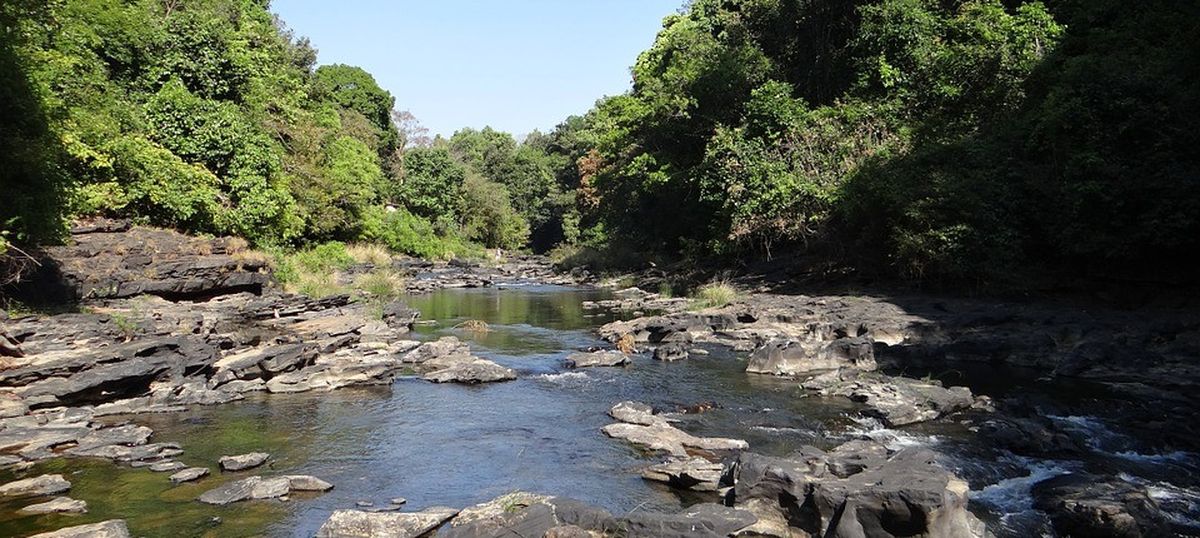With the Centre giving the consent of its Central Water Commission to the DPRs of Karnataka's Kalasa-Bhandura projects to divert Mhadei waters to the Malaprabha basin, a mayhem of sorts, thoughts and political narratives in the public discourse has gripped Goa for the last week or so. The Goan delves into the nearly 50-year-long tug of war between Goa and Karnataka for the coveted waters of the river and unveils multiple facets of the dispute -- its history, politics, the ecological debate and the possible way forward.

Saga began in 1973
Even as almost anyone and everyone has an opinion or something to say about the Mhadei dispute, many are unaware that the fight for the coveted waters of Mhadei pre-dates the creation of the State of Goa on May 30, 1987.
The tug-of-war between Goa and Karnataka for Mhadei in fact originates nearly 50 years ago with the proposal of the Mhadei Hydroelectricity generation project in 1973. Goa, then a tiny Union Territory with outlying territories of Daman and Diu appended, with the late Shashikala Kakodkar as Chief Minister, strongly objected. The Centre was doing the bidding for Goa as it was a Union Territory and Karnataka had to give up on the power project.
Yet another half-hearted attempt to harness the waters of the Mhadei came in the early days of Goa as a State. In 1988, 3.85 TMC of water was proposed to be diverted from Katla and Palna, both feeder tributaries of the Mhadei and contiguous with Dudhsagar to the Kali river basin via the Supa reservoir. The proposal also involved drawing 1.06 TMC from Khandepar, another tributary of Mhadei in Goa. The plans were shelved when the PDF government headed by Dr Luis Proto Barbosa used its political clout with the National Front government of VP Singh and later Chandrashekar to block it.
Karnataka's pursuit of the Mhadei waters continued and they revived the water diversion demand from a new front, this time with Kalasa-Bhandura projects for 7-odd TMC of water.
1980s: Kalasa-Bhandura idea emerges
The demand for water in the parched Hubbali-Dharwad areas of North Karnataka emanated from agitation in the early 1980s, when R Gundu Rao, the father of Congress leader Dinesh Gundu Rao was the neighbouring State's chief minister. Gundu Rao Sr formed a House Committee to go into Hubbali-Dharwad's demand for water and recommend solutions.
That committee was headed by then Opposition Leader the late S R Bommai, who represented Hubbali and is coincidental the father of present Chief Minister Basavaraj Bommai. It was this committee that came up with the plan to divert Mhadei waters from Kalasa and Bhandura with dams and a network of canals into the Malaprabha basin.
This plan was vigorously pursued first in 1994, when a conducive political situation existed with Congress in power at the Centre as well as in both the warring states and later in 1996 when H D Devegowda became Prime Minister. On both occasions, however, nothing much came up of Karnataka's proposals. Other than a few Chief Minister level talks between Goa and Karnataka, it remained a proposal on paper.
Dispute in the new millennium
The turn of the century and the beginning of the new millennium saw a new twist to the Mhadei dispute as Karnataka kept coveting the river's waters, and the SM Krishna government pursued the Centre's clearance for the Kalasa-Bhandura projects.
Hell broke loose when the then-A B Vajpayee government gave in-principle approval to the project in 2002. It is history now, that an all-party delegation led by then Goa chief minister, the late Manohar Parrikar, forced the Vajpayee government's hand and got that approval reversed.
A hurried decision by the Parrikar government in July 2002 transformed the nature of this tug-of-war between Goa and Karnataka, from a 'neighbourly fight' to a formal inter-State water sharing dispute, perhaps a pre-condition Vajpayee put for agreeing to withdraw the Centre's in-principle consent for the Kalasa-Bhandura projects.
In 2002, Parrikar got a cabinet decision passed and made a formal request to the Centre under Section 3 of the Inter-State River Water Disputes Act, 1956 to constitute a Tribunal and refer the Mhadei matter for adjudication.
The tribunal -- Mahadayi Water Dispute Tribunal -- was eventually constituted by the Manmohan Singh-led UPA-II government in 2010 before which proceedings began only in 2013 and the first award passed on August 14, 2018, allocating 13.7 TMC to Karnataka, including the controversial 3.9 TMC for diversion to Malaprabha from Kalasa and Bhandura.
The controversy today
The emerging controversy today has erupted from the news that the Central Water Commission (CWC) has given its consent to the two Detailed Project Reports (DPRs) of Karnataka for dams at Kalasa and Bhandura and the related diversion of 3.9 TMC of water into the Malaprabha basin.
What has fueled the fire of the controversy is the timing of this CWC nod for the DPRs, just ahead of an assembly election due in Karnataka. Else, it can be dismissed as a mere corollary to the August 14, 2018 award of the Tribunal, which incidentally is today law, with its notification in the Central Government's Gazette on February 27, 2020. It is another matter that the validity of the award itself, is sub-judice before the Supreme Court of India, following its challenge by all the three co-basin States -- Goa, Karnataka and Maharashtra.